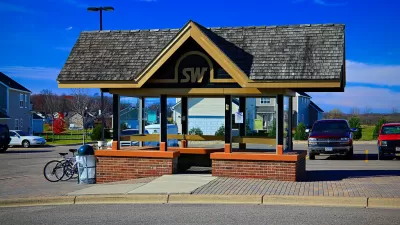At long last, after more than a thousand days of politicking, Congress passed a comprehensive federal transportation funding bill on Friday. Transportation reform advocates are disappointed by the results.
With the clock ticking on the expiration of the federal highway trust fund, and a tenth extension to the previous transportation bill looming, Congressional negotiators reached agreement on a long-term transportation bill for the first time in seven years. With a prime opportunity to reform the nation's transportation policy from the top down in response to the historically high usage of public transit nationwide and a sustained decline in driving, Congress instead approved, "A stopgap that is the last gasp of a spent 20th century program," writes Transportation for America Director James Corless. "It doesn't begin to address the needs of a changing America in the 21st century."
Passing the House by a vote of 373 to 52 and the Senate by 74 to 19, "the nation's new transportation policy is a grave disappointment to people seeking to reform the current highway-centric system," writes Tanya Snyder.
"This is a bill that's been called 'a death blow to mass transit' by the Amalgamated Transit Union, 'a step backwards for America's transportation system' by the Rails-to-Trails Conservancy, 'a retreat from the goals of sustainability and economic resiliency' by Reconnecting America, 'a substantial capitulation' by Transportation for America, and 'bad news for biking and walking' by America Bikes."
Snyder delivers a rundown of the contents of the final agreement, which managed to avoid the worst elements of what House Republican leaders sought (such as Keystone pipeline approval and disconnecting transit funding from the highway trust fund), but "falls far short of progress."
FULL STORY: A New Bill Passes, But America’s Transpo Policy Stays Stuck in 20th Century

Maui's Vacation Rental Debate Turns Ugly
Verbal attacks, misinformation campaigns and fistfights plague a high-stakes debate to convert thousands of vacation rentals into long-term housing.

Planetizen Federal Action Tracker
A weekly monitor of how Trump’s orders and actions are impacting planners and planning in America.

San Francisco Suspends Traffic Calming Amidst Record Deaths
Citing “a challenging fiscal landscape,” the city will cease the program on the heels of 42 traffic deaths, including 24 pedestrians.

Defunct Pittsburgh Power Plant to Become Residential Tower
A decommissioned steam heat plant will be redeveloped into almost 100 affordable housing units.

Trump Prompts Restructuring of Transportation Research Board in “Unprecedented Overreach”
The TRB has eliminated more than half of its committees including those focused on climate, equity, and cities.

Amtrak Rolls Out New Orleans to Alabama “Mardi Gras” Train
The new service will operate morning and evening departures between Mobile and New Orleans.
Urban Design for Planners 1: Software Tools
This six-course series explores essential urban design concepts using open source software and equips planners with the tools they need to participate fully in the urban design process.
Planning for Universal Design
Learn the tools for implementing Universal Design in planning regulations.
Heyer Gruel & Associates PA
JM Goldson LLC
Custer County Colorado
City of Camden Redevelopment Agency
City of Astoria
Transportation Research & Education Center (TREC) at Portland State University
Jefferson Parish Government
Camden Redevelopment Agency
City of Claremont




























